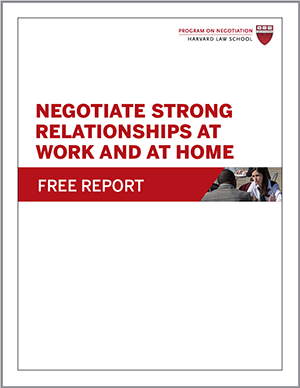
Emotional flooding – when strong, specific, and often negative feelings overwhelm us – poses obvious hazards to negotiators, who need to be able to think clearly when faced with the complex, strategically demanding task of creating and claiming value.
For this reason, emotional regulation can be an essential component of negotiation.
But different types of regulation create different results.
In a 2000 study, James Gross, Jane Richards, and Oliver John explored the social and cognitive costs of two forms of emotional regulation: suppression, or controlling one’s emotions by not expressing them; and reappraisal, or controlling emotions by changing the way one thinks about the situation.
When your counterpart makes a personal attack against you, you might suppress your emotions in an attempt to resist “rising to the bait.”
But if you expect your opponent to try to put you off balance at key moments, you can use the attack to help you identify important issues.
Comparing the effect of these two regulation strategies, the researchers found that negotiators who suppressed their emotion experienced impaired cognitive processing.
What’s more, they were less well liked by their counterparts, a fact that may have diminished their ability to engage in future joint value creation.
It’s unwise to suppress emotions in negotiations, and not just because suppression is likely to lead to worse outcomes and greater rancor.
Trying to suppress a feeling that comes on strong – such as the outrage you may feel after being issued a threat – can be almost impossible.
Emotions provide both you and your counterpart with unique information that may lead to mutually beneficial outcomes.
Instead of trying to suppress your feelings, consider when you may be subject to strong emotional experiences in advance and reappraise the situation before experiencing the emotion.
Through reappraisal, you can focus on the meaning of a situation and anticipate your emotional reaction.
What if you decided ahead of time to view a threat as providing important information about what the other side values?
Rather than reacting emotionally, you could use the information to adjust aspects of future proposals.
Adapted from “Emotional Strategy” in the February 2005 issue of Negotiation by Margaret A. Neale.





I disagree that “It’s unwise to suppress emotions in negotiations,…” I believe rationally describing mutual interests is a far better way to identify issues and achieve goals. Exhibiting strong and distressed emotions during negotiations may have cathartic benefits, but invites emotional responses. A good negotiator should do self-examination when tempted or maneuvered into becoming emotional, and determine what issue is associated with that response. Only then can the negotiation identify the triggers for the emotions and help address, or give up, the underlying triggers.